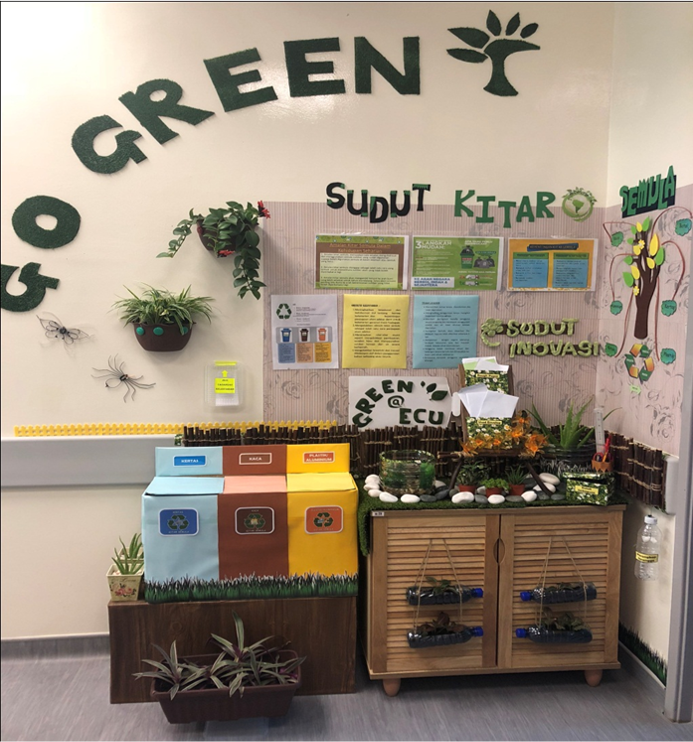Waste management always is a big challenge for many countries, recycling is a very practical way to cope with environmental issues. To segregate and recycle those recyclable wastes be able to reduce the burden of the landfills in our country, also easy to be practising in our daily life, including university students. The aims of the waste management campaign in AMDI are to increase the awareness among staff and students to protect our environment, particularly to reduce the single-use plastic in daily life, because plastic does not be decomposed for thousand years, millions of tone plastic is entering to oceans every year, endanger marine life and at the end, those microplastics are ingested back into human via eating fishes, threaten our health.
Few initiatives have been implemented to encourage AMDI’s staff and students to practise recycling in Clinical Trials Centre (CTC) and Animal Research Centre (ARC). Pn Law Kim Sooi from clinical and her team started to set up several recycle corners in CTC since year 2018. The recycle corners have been setting up in all departments, CTC. Some staff in the department are assigned to monitor the recycling bins in their department, when the resources are full, they will keep the resources in a storeroom, and contact the recycle company to collect. The initiative is getting a very good response from the CTC’s staff, not only they recycle the recyclable items, but also decorated the recycle corners, to make them more attractive, look beautiful and tidy.
Recycle corner in CTC
Dr Tan Mei Lan who was one of the pioneer staff of IPPT, realized that USM spent a lot to discard biohazard waste. She noticed that researchers and postgraduate students in most laboratories used a lot of single-use plastics in their daily experiments and discard them as biohazard waste. However, a lot of these single-use plastic wastes are non-hazardous, non-infectious and non-chemical in nature. These wastes can be cleaned and decontaminated before they can be recycled. Hence, she initiated the laboratory plastic recycle campaign 2019, with two other scientists, namely, Dr Shahrul and Dr Chee Keat. Prior to the campaign, the local recyclers were invited to the oncology laboratory to inspect and check on the recyclable potential of the laboratory plastics. The scientists involved also made a trip to the plastic recycler factory to evaluate and learn about the recycling processes. Upon confirmation that the plastics can be recycled, SOPs for decontamination was developed and the single-use laboratory plastic recycling campaign was mooted. The postgraduate students in the oncology laboratory were instrumental in making the campaign a success. By May 2021, we have successfully accumulated approximately 50 kilograms of laboratory plastics and collected by the recycling company and in the process, earned some income for USM!
These plastic wastes were supposed to be dumped into the landfills, but we have successfully recycled them instead, endowed the second life of the plastics. Although the quantities of the plastics collected were small (because the wastes only came from a single laboratory in oncology cluster), but the initiative was a good start. We have proven that non-hazardous, non-infectious and non-chemical single-use laboratory plastics can be recycled.
Laboratory Plastic recycle corner in ARC with clear SOPs.
Laboratory plastics were packed in plastic bags to be collected by the local recyclers.
Main challenges and further plans
Although we are receiving quite a good start for both campaigns (recycle corners in CTC, recycle laboratory plastic in ARC) since the year 2018, but still lack support from IPPTs’ staff and students. To extend the campaigns, we need more staff or students to join us so that we can go far, for the sake of our environments. To increase the awareness among AMDI staff and students, we had organised a seminar in August 2020, given a talk on the possibility to recycle laboratory plastic. In April this year, we had another online webinar with the title “Reduce single-use plastic in campus” in conjunction with USM sustainability month. We also created a Micro-Credential course, “Waste reduction and recycling in campus “under the Centre for Development of Academic Excellent (CDAE), so that USM students be able to enrol on the recycling course anytime, anywhere, for free.
We are also collaborating with the Centre for Global Sustainability Studies (CGSS), USM and non-governmental organization (NGO) to promote environmental awareness program in USM, including to establish first Environment Education Protection Hup, setting up few recycling corners in campus, and will be organising series of activities, seminars, campaigns to the staff and students in USM, we hope that we can also recruit more student volunteers and more staff to join us to promote the environmental awareness among USM staff and students. We can achieve our ultimate goals, a green campus! When students are completed their study at USM, they not only stepping out from USM with the degree scrolls, not only become more knowledgeable graduates, but also have the sense of connection to nature, to appreciate nature, and be able to protect our only planet, which is Earth!
By:
1Ying Chee Keat, 1Tan Mei Lan, 1Shahrul Bariyah, 2Law Kim Sooi
1Kluster of Oncological and Radiological Sciences, Advanced Medical and Dental Institute
2Division of Clinical, Sustainability and Standards, Advanced Medical and Dental Institute





